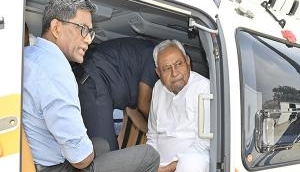Black money & looking for a solution: What an 'inclusive' state must do

'Cash is neither black nor white but circumstances make it so' is an appropriate description. And the principal determinant of status is whether the tax due on the transaction that generated the cash has been paid or not.
The fundamental cause, therefore, of the generation of 'black' money is the reluctance of economic agents to pay due taxes.
The obvious motivation behind this is human greed combined with an assessment that the benefits of not paying tax exceeds the costs of getting caught.
This in turn implies a degree of inefficiency in the tax administration system - the nonpayment will not be noticed - and/or an element of corruption, whereby if noticed, the transgression will not be penalised as per the rules on payment of a bribe, which shall be only a percentage of the total amount of tax and penalty due.
The story, however, does not end here. Despite the fact that the state has been defined as the institution with a 'monopoly over legitimate violence' in a physical territory and society, the relationship between the citizen and the state extends beyond fear of legitimate violence, efficiently implemented.
A social contract
A significant element of the social contract in the context of a democracy, is the commitment of a legitimate state to protect and serve and for dutiful citizens to obey its legal demands including demands for taxes to finance its multifarious activities.
Such an 'inclusive' state (to use the terminology popularised by Professors Acemoglu and Robinson in their Why Nations Fail - the Origins of Power, Prosperity and Poverty) is one with power distributed broadly in society and the use of state power - including legitimate violence - subject to constraints.
The state ensures law and order, the dispensation of justice, public services, and equal opportunity and positive incentives for all citizens to progress and prosper and to pay their legitimate dues to society including taxes.
In an 'extractive' state, on the other hand, motivation to be a good citizen are weaker. State power is concentrated in a narrow elite and is relatively unconstrained and arbitrary. Public services are poor, justice is difficult and very expensive, and opportunities are limited to the ruling elite. 'Extractive' states do not good citizens make.
A matter of taxes
Shifting from studies of development and institutions, political and economic, to tax administration reforms, we find a striking similarity in points of view.
A look at the 'First Report of the Tax Administration Reforms Commission'(TARC) submitted on 30 May 2014, to the Ministry of Finance is revealing.
The TARC has observed that 'taxpayers services must comprise the first focus of a tax administration' and these services must be 'designed to improve the experience of taxpayers with the tax departments'.
In this context the Commission concluded that, "A crucial deficiency is a fundamental lack of customer focus in the Indian tax administration, which is in stark contrast to modernising and reforming tax administrations. The randomness and uncertainty in tax demands, the rudeness and abrasiveness in tax officer behaviour towards taxpayers, totally obviating the latter's stakeholder role, the inconsistency in demands made on similar tax matters without accountability, and the often poor quality of show cause notices have combined to project the tax administration in its poorest light in the eyes not only of the taxpayer but of society at large."
Furthermore the following observation is also significant that, "...an issue that cannot be ignored...is that of moral hazard. Taxpayers openly complained during the TARC's consultations about their helplessness against demands for bribes to make refunds, to hold back infructuous demands, or speed up processes from dormancy. While no officers' names were mentioned for fear of retribution, the TARC views that the open claims made by stakeholders is a cause for deep concern. Even senior officers admitted their ineffectiveness in controlling this growing phenomenon."
Faults in the system
The Commission, in addition to taxpayer services also focused on many other issues of tax administration including the internal org-structure of the tax setup, the often dysfunctional internal HR policies , the need for increasing use of information technology, grievance redressal mechanisms etc.
For our purpose of investigating the phenomenon of 'black' money, however, the emphasis on 'customer focus' and 'taxpayer services' is important because it highlights the issue of positive motivation essential for a modern, 'inclusive' state, society and tax administration.
The Commissions' observations serve to highlight just how important these 'missing' elements are.
Scholars have observed that institutions - the rules determining the patterns of interaction between citizens and between citizens and the state - tend to persist over long periods of time.
And while we may be an ancient culture, we are a young nation and democracy. The detritus of our past is still with us.
The state can therefore contest that a firm hand is needed to keep the baaghi Indian taxpayer in line - remember the salt satyagraha? But it takes two hands to clap here.
The state has to be 'inclusive' to bridge the 'trust deficit' that history has left us as legacy. The sahib has to serve - not rule, the kotwal - protect not threaten.
The citizen has to see her tax rupees work for her welfare, not a coterie of fat cats prospering at her expense.
When we demonise 'black' money we must begin with the funding of political parties and election and institutionalised state corruption established over more than sixty years of Independence with deep roots in our feudal and colonial history.
Parivartan is indeed called for - applicable to every institution and individual everywhere.
The issue is a serious one and must be dealt with seriously and comprehensively.
First published: 19 November 2016, 1:23 IST





![BJP's Kapil Mishra recreates Shankar Mahadevan’s ‘Breathless’ song to highlight Delhi pollution [WATCH] BJP's Kapil Mishra recreates Shankar Mahadevan’s ‘Breathless’ song to highlight Delhi pollution [WATCH]](https://images.catchnews.com/upload/2022/11/03/kapil-mishra_240884_300x172.png)

![Anupam Kher shares pictures of his toned body on 67th birthday [MUST SEE] Anupam Kher shares pictures of his toned body on 67th birthday [MUST SEE]](https://images.catchnews.com/upload/2022/03/07/Anupam_kher_231145_300x172.jpg)






